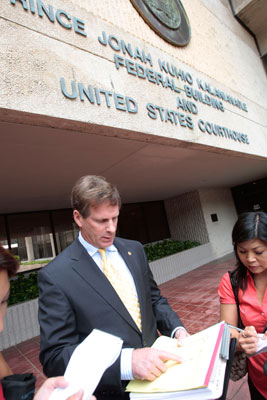Maui man guilty in leak of B-2 secrets

Federal Prosecutor Kenneth M. Sorenson talked with the media outside the Federal Courthouse after yesterday's verdict against Noshir S. Gowadia. Sorenson said information provided by Gowadia could be "utilized by foreign governments and potential adversaries to develop methods for countering the B-2 threat."
The man who touts himself as the father of the B-2 bomber is facing life in prison when he is sentenced later this year for espionage for helping the Chinese government design a stealthy cruise missile and for disclosing to others secrets about the premier American bomber.
A federal jury found Noshir S. Gowadia, 66, guilty yesterday of using classified data about American infrared detecting devices and skills he obtained while working as a U.S. defense contractor to help the Chinese develop a cruise missile capable of evading heat-seeking, air-to-air missiles and of disclosing to the Swiss government and businesses in Germany and Israel how close an enemy aircraft would have to be for its heat-seeking missiles to target a B-2.
The jury also found Gowadia guilty of money laundering and tax evasion.
"He is disappointed," said David Klein, one of Gowadia’s two court-appointed lawyers. "There will be an appeal on the case."
Gowadia made at least six trips into China between July 2003 and June 2005 and exchanged numerous secret e-mails to help the Chinese develop a cruise missile exhaust nozzle that makes the missile harder for American infrared devices to detect.
He testified that he used basic information that is publicly available to analyze the exhaust flow of the Chinese nozzle. Gowadia also said cruise missiles do not need stealth technology because they are already impossible to shoot down using heat-seeking air-to-air missiles.
Don't miss out on what's happening!
Stay in touch with breaking news, as it happens, conveniently in your email inbox. It's FREE!
Kenneth M. Sorenson, the assistant U.S. attorney who prosecuted the case, disputed that.

"We shoot down cruise missiles all the time with IR (infrared, or heat-seeking) missiles," Sorenson said. "They are extremely susceptible to IR missiles. And if they weren’t, the Chinese wouldn’t have been interested in making a stealthy cruise missile that would be impervious to IR missiles."
Gowadia also sent information about the IR targeting lock-on range of the B-2 to officials of the Swiss government and businesses in Germany and Israel in the hope that they would hire him to make their aircraft less susceptible to attacks from heat-seeking missiles.
He said the data he included in his marketing letters were unusable because they were incomplete. And even if they were complete, nobody could use them to harm the B-2 because the aircraft derives its stealth qualities from its ability to evade detection by radar, not infrared sensors.
"That’s clearly ludicrous," Sorenson said. "That can be utilized by foreign governments and potential adversaries to develop methods for countering the B-2 threat."
The government says the Chinese paid Gowadia $84,000.
Neither the Swiss nor the businesses in Germany and Israel hired Gowadia.
The money laundering and tax evasion charges stem from Gowadia’s use of secret Swiss bank accounts to receive the income from his private contracting work and funnel just enough money to him on Maui to pay for his multimillion-dollar home and cover his tax exemptions.
The jury listened to 39 days of often very technical testimony and deliberated 5 1/2 days before rendering its verdicts.
Gowadia’s adult son and daughter sat through the entire trial. They left the courtroom without comment yesterday.
It took the government five years to bring the case to trial, in large part because of the sensitive nature of the information it needed to present to the jury to prove its case.
In addition to a prison term, Gowadia stands to lose the proceeds of the sale of his home in Haiku, Maui. He had agreed to sell the home following his arrest in 2005, rather than have the interest accumulate while he remained in custody unable to pay the $14,000 monthly mortgage.
Gowadia, a naturalized U.S. citizen from India, worked as an aerospace engineer for U.S. defense contracting giant Northrop Corp. from 1967 to 1986. When Northrop won the contract for the B-2, Gowadia said he came up with the conceptual design for the aircraft that would become what Sorenson describes as "our nation’s most important strategic asset."
After leaving Northrop, Gowadia set up his own contracting business and continued to work on U.S. defense projects.




